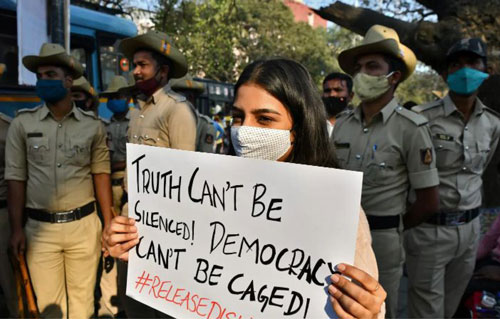The declining space for freedom of expression in India has put the country in the league of authoritar-ian regimes in the world.
India continues to rank among the top 10 coun-tries to have imprisoned the most number of writers and journalists, according to the Freedom to Write Index 2021. The index was released on April 13 by PEN America, a US non-profit working to defend freedom of expression across the world. The organi-sation lists the number of writers, activists, and jour-nalists that countries have put behind bars every year.
Myanmar rose several ranks with a far greater number of arrests in 2021, on the back of the military coup in the country.
In India, meanwhile, many continue to face coercive action from authorities for their public stand on issues.
For instance, activists, and writers arrested in connection with the Elgar Parishad case of December 2017, remain in prison. The matter pertains to vio-lence following the right-wing Hindutva groups’ pushback during the 200th-anniversary celebrations of the battle of Bhima Koregaon.
Three journalists were arrested last month in Uttar Pradesh for allegedly reporting an exam paper leak. Earlier, a case was filed against another alleg-edly for exposing the poor implementation of the mid-day meal scheme in the state.
Journalists and activists like Aakar Patel and Rana Ayyub, who have been trenchant critics of India’s government, have been piled with look-out notices and subjected to probes.
While the arrests form the basis of India’s rank-ing, the authors of the report note that they also underscore the larger political climate in the country.
“More broadly, the environment for free expres-sion in India continued to decline in 2021,” the report said. “Freedom House, which had downgraded India from ‘Free’ to ‘Partly Free’ in their annual Freedom in the World report for 2020, noted further worrying trends in 2021, including a February 2021 law re-stricting anonymity and encryption on social media applications, and the official use of Pegasus spyware against journalists and human rights activists.”
It said dissident voices continue to experience pressure through detentions, travel bans, and threats from security forces—all aimed at muffling their criticism.—AP










